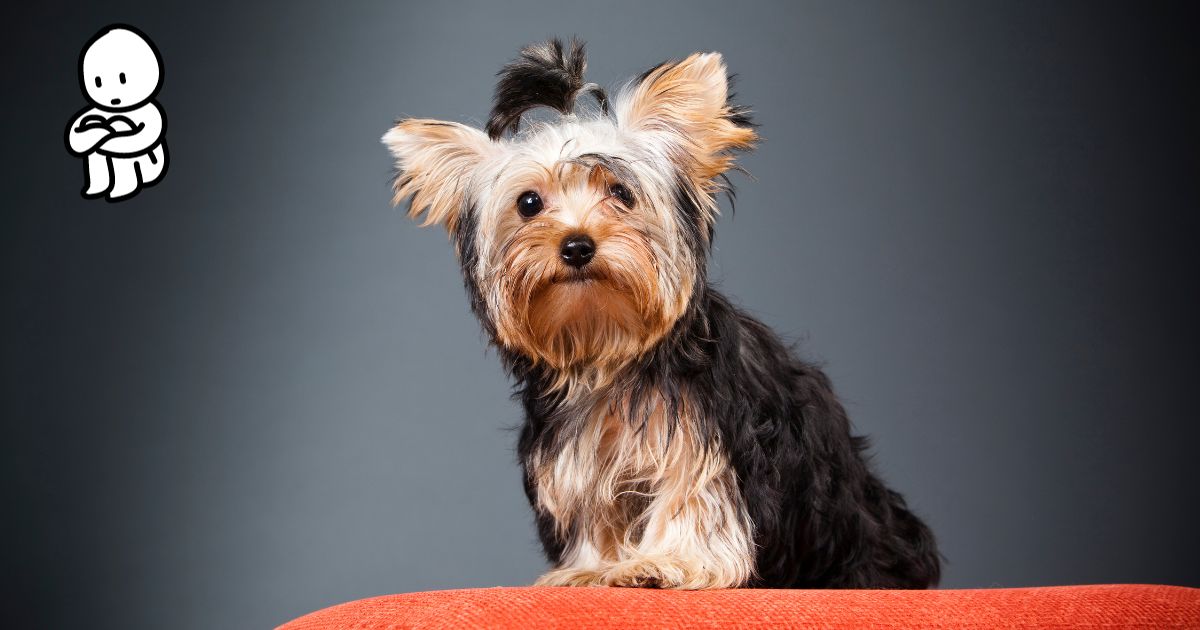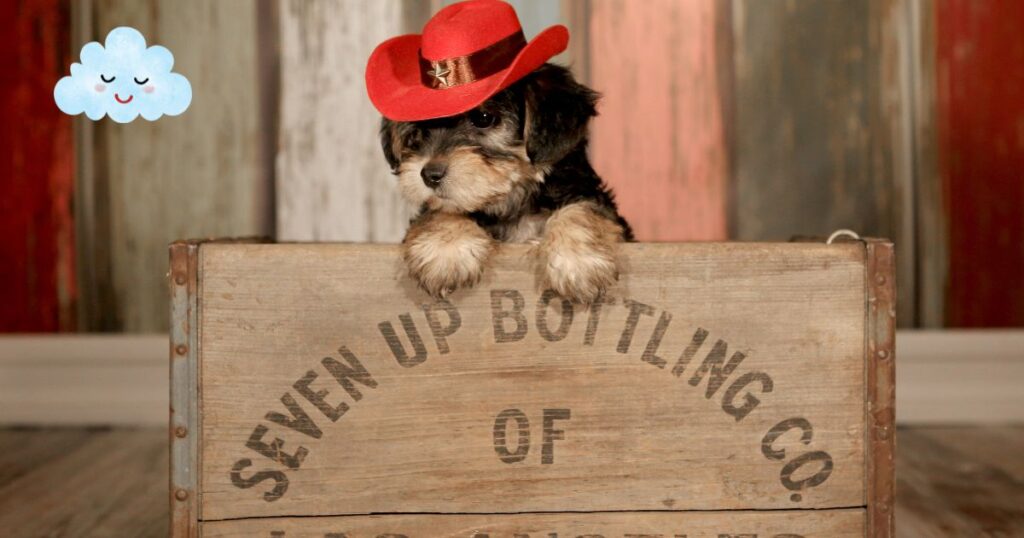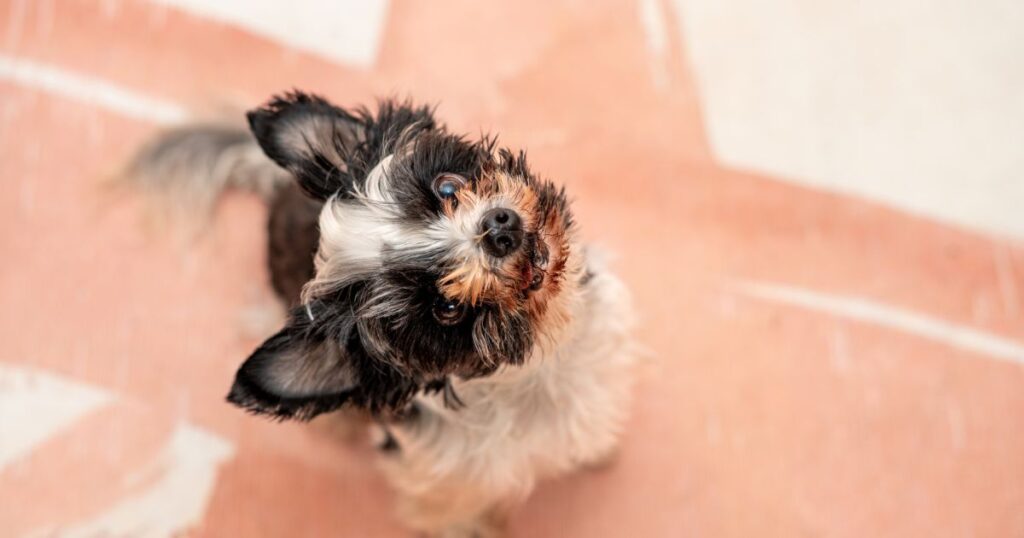Can Yorkies Be Left Alone? [Guide For First Time Owners]

When it comes to leaving your Yorkie at home, creating a secure and cozy environment is important. Just like any family member, your Yorkie deserves a space where they feel safe, even in your absence. Any anxiety your pet might experience during alone time can be eliminated by a carefully arranged space.
As devoted Yorkie owners, we understand the love and care you provide to your furry companions. However, there may be times when you need to leave your adorable Yorkie at home.
This guide will delve into various aspects of Yorkie care when they are left alone. From understanding their behavior to providing mental and physical stimulation, we will address all your concerns. By following our advice, you can establish a routine that ensures your Yorkie’s happiness and emotional well-being, even when you’re not there.
Separation Anxiety and Yorkie Behavior
Leaving your beloved Yorkie alone, even for short durations, can evoke a range of emotions for both you and your furry companion. It’s essential to have a deep understanding of their behavior and how they may react when separated from you. Additionally, addressing potential separation anxiety is crucial for ensuring their overall well-being.
Yorkie Behavior When Left Alone
Yorkies, known for their affectionate and lively nature, can display various behaviors when left alone. Some common behaviors you might observe include:
- Whining or Barking
- Destructive Chewing
- Potty Accidents
- Restlessness
- Decreased Appetite
Separation Anxiety in Yorkies
Separation anxiety is a common issue among Yorkies and many other dog breeds. It’s a condition where your furry friend experiences distress when separated from you. This emotional response can lead to undesirable behaviors, affecting their quality of life.
Impact of Separation Anxiety: When your Yorkie experiences separation anxiety, it’s not just a temporary emotional state. It can have both short-term and long-term effects on their well-being, including:
- Stress and Anxiety: Yorkies with separation anxiety can undergo significant stress, leading to both physical and emotional discomfort.
- Behavioral Issues: The anxiety might be displayed as destructive behavior, excessive barking, or other undesirable habits.
- Health Impact: Prolonged anxiety can impact your Yorkie’s physical health, potentially leading to gastrointestinal problems, a weakened immune system, and more.
Understanding your Yorkie’s behavior and addressing separation anxiety will open the path to more relaxed and satisfied alone time.

At What Age Can Yorkies Be Left Alone?
Understanding the ideal duration to leave your Yorkie alone is a vital aspect of responsible pet ownership. Both age and health factors play a crucial role in determining how long your furry friends can comfortably manage to be by themselves.
Leaving Adult Yorkies Alone
Adult Yorkies, typically between 1 and 8 years old, tend to be more self-sufficient than their younger counterparts. This does not imply that they can endure prolonged isolation though. Here’s a guideline to help you decide suitable alone time durations:
- Short Times: For adult Yorkies, it’s generally acceptable to leave them alone for around 4 to 6 hours. This duration ensures they have time to rest, eat, and relieve themselves.
- Breaks and Interaction: During longer periods of absence, aim to arrange for a mid-day break or interaction. This could involve a trusted friend or pet sitter dropping by to provide companionship, playtime, and a bathroom break.
Leaving Senior Yorkies Alone
As Yorkies enter their senior years, usually around 9 years and older, their needs and capabilities may change. They might be more prone to certain health issues and could require extra attention. Consider the following when determining the alone time for senior Yorkies:
- Reduced Stamina: Senior Yorkies might have lower energy levels and reduced stamina, making alone time shorter is advisable. Aim for no more than 3 to 4 hours alone.
- Health Considerations: Take your senior Yorkie’s health into account. Certain medical conditions might necessitate more frequent breaks, medication use, or specialized care.
- Comfort and Safety: Ensure their surroundings are safe and comfortable. Senior Yorkies might benefit from a cozy bed, easy access to water, and a familiar environment.
It’s important to remember that each Yorkie is unique, and their ability to handle alone time can vary based on factors beyond age. Pay attention to their behavior, appetite, and overall well-being. If you notice any changes, consider adjusting the duration accordingly.
Remember, leaving your Yorkie alone should always be approached with sensitivity to their needs. Incorporating mental and physical stimulation, along with a predictable routine is necessary.
Training Your Yorkie to Be Comfortable While Alone
It takes time, persistence, and excellent training methods to ensure that your Yorkie feels secure when left alone. By implementing the right strategies, you can help your furry friend develop a positive association with aloneness and reduce the likelihood of separation anxiety.

Creating Positive Associations with Loneliness
Creating a positive connection between alone time and positive experiences is the foundation of training. Here’s how you can achieve this:
- Gradual Departures: Practice short departures at first, then progressively extend your absences. This helps your Yorkie understand that you will always return.
- Use Interactive Toys: Introduce engaging toys, treat puzzles, or food-dispensing toys before you leave. This provides mental stimulation and distracts your Yorkie from your absence.
- Background Noise: Leave on soothing background noise, like soft music or a calming podcast, to keep them away from exterior sounds that might trigger anxiety.
Crate Training Method
Crate training can be a beneficial tool for teaching your Yorkie to feel secure during alone time. When done correctly, a crate becomes a safe haven for your furry friend. Here’s how to go about it:
- Size Matters: Choose an appropriately sized crate that allows your Yorkie to stand, turn, and lie down comfortably. A crate that’s too large might not feel as cozy and secure.
- Positive Introduction: Make the crate inviting by placing treats, toys, and a soft blanket inside. Allow your Yorkie to explore the crate on their terms before using it for alone time.
- Gradual Acclimatization: Begin with short periods of crate sessions while you’re home. Gradually increase the duration as your Yorkie becomes more comfortable.
- Positive Reinforcement: Offer treats, praise, and encouragement when your Yorkie enters the crate willingly. This helps them correlate the crate with positive experiences.

Make Separation a Positive Experience
Positive reinforcement plays a significant role in helping your Yorkie develop a positive perspective on being alone. Here’s how you can incorporate this into their training:
- Reward Good Behavior: When your Yorkie remains calm and composed during your leaving time, reward them with treats and love upon your return.
- Consistency is Key: Be consistent in your training routine. Frequent, positive experiences during alone time help build your Yorkie’s confidence.
- Avoid Punishment: Never scold or punish your Yorkie for showing anxiety during alone time. This can worsen their anxiety and delay the training process.
Each Yorkshire Terrier has a unique personality, thus the level of training they receive will vary. Customize your training sessions according to their nature and behavior. By dedicating time and effort, you may help your beloved companion feel more at ease and confident while they are by themselves.
Focus on Mental and Physical Exercise
Ensuring that your Yorkie remains mentally and physically engaged during their alone time is essential for their well-being. Boredom and loneliness can lead to stress and anxiety, which we aim to prevent through a variety of stimulating activities and interactive toys.
The Importance of Mental Stimulation
Mental stimulation is crucial for Yorkies, much like physical exercise. It prevents boredom and eases anxiety during alone time. Activities like puzzles, treat-dispensing toys, and games engage their problem-solving skills, maintaining mental sharpness.
These stimulating experiences distract from isolation, lowering separation anxiety risks. Similar to physical exercise, mental stimulation leaves your Yorkie satisfied.
Interactive Toys and Activities
To keep your Yorkie entertained and mentally engaged, consider these interactive toys and activities:
- Puzzle Feeders: These toys require your Yorkie to figure out how to get rewards, providing mental exercise and a rewarding experience.
- Hide and Seek: Hide treats or toys around the house for your Yorkie to discover. Encourage them to investigate the hidden toys to keep them mentally engaged.
- Sensory Toys: Toys with various textures, shapes, and sounds stimulate your Yorkie’s senses, providing hours of sensory enjoyment.
- Frozen Treats: Freeze a mixture of dog-friendly treats and water in a toy or container. This provides a cooling, engaging, and tasty challenge.
- Ball Launchers: These toys toss balls automatically, encouraging your Yorkie to chase and retrieve, even when you’re not around.

Physical Activity to Prepare Yorkie for Alone Time
Incorporating physical exercise into your Yorkie’s routine is equally important. Engaging their body helps burn energy and contributes to their overall well-being. Here’s how you can ensure physical activity:
- Morning Walks: Begin each day with a refreshing morning walk, which not only helps maintain energy levels but also promotes cardiovascular health.
- Play Fetch: Playing a classic game of fetch, whether indoors or in your backyard, provides an enjoyable opportunity for your Yorkie to spend energy while simultaneously stimulating their mind as they chase after the tossed toy.
- Obstacle Courses: Create simple yet exciting obstacle challenges within the comfort of your home, using everyday items like pillows, boxes, or tunnels. These challenges encourage your Yorkie to navigate through and provide both a physical and mental challenge.
- Tug of War: A gentle game of tug of war can be a delightful and physically stimulating activity that strengthens the bond between you and your furry companion.
- Scheduled Playtime: Designate specific playtimes throughout the day to ensure your Yorkie gets regular breaks for activity.
By incorporating these various forms of physical exercise, you not only help your Yorkie maintain a healthy weight and physical condition but also contribute to their emotional well-being, ultimately leading to a happier and more satisfied canine companion.

Importance of Calm and Safe Environment
By creating a safe and enjoyable environment for your Yorkie, you provide them with promising treats when they are left alone. Combined with mental and physical stimulation, this designated space contributes to their overall well-being during their alone time.
Preparing a Safe and Cozy Space
Designating a specific area in your home for your Yorkie to spend their alone time is a wise decision. Here’s how you can create a safe and cozy space for them:
- Quiet Corner: Choose a quiet corner of your home, away from high-traffic areas and excessive noise. This allows your Yorkie to relax and rest peacefully.
- Comfortable Bed: Provide a soft and comfortable bed or blanket where your Yorkie can rest and feel at ease. Familiar scents can also help soothe their anxiety.
- Natural Light and Ventilation: Ensure the area has access to natural light and proper ventilation. Fresh air and daylight contribute to a pleasant environment.
- Access to Water: Always have a bowl of fresh water accessible to your Yorkie, so they stay hydrated during their alone time.
- Small Space: Limit the space to prevent your Yorkie from wandering too much. A small area can make them feel secure and prevent potty accidents.

Creating Accident-free Environment
Pet-proofing your home is essential to keep your Yorkie safe and prevent accidents or injuries. Here’s what you should consider:
- Secure Dangerous Items: Ensure that any toxic substances, sharp objects, or small choking hazards are safely stored out of your Yorkie’s reach.
- Electrical Cords: Keep electrical cords neatly folded away or covered to prevent your Yorkie from chewing on them.
- Houseplants: Some houseplants can be toxic to dogs. Check that all indoor plants are non-toxic and pose no harm to your furry friend.
- Trash Cans: Use a lockable garbage can with a cover to stop your Yorkie from searching through and consuming dangerous materials.
- Gates and Barriers: Install baby gates or barriers in areas where you don’t want your Yorkie to access, such as stairs or certain rooms.
- Windows and Balconies: Ensure that windows and balconies are securely closed or have protective shields to prevent accidental falls.
Getting Your Yorkie Used to the Environment
Introduce the designated space gradually to your Yorkie to help them become familiar and comfortable with it. Link the area with positive experiences, using treats, toys, and praise during initial introductions. Spend some time together in the space, engaging in play or relaxing, to build positive associations.
How to Identify and Treat Separation Anxiety?
Recognizing and addressing separation anxiety in your Yorkie is crucial for their emotional well-being and overall happiness. Yorkies are known for their strong bond with their owners, and when left alone, they may experience different levels of stress.
Signs of Separation Anxiety
Yorkies with separation anxiety may exhibit a range of distress-related behaviors when left alone. These behaviors can include excessive barking or whining, indicating their discomfort.
They might engage in destructive actions such as scratching doors or chewing furniture as a response to anxiety. Restlessness and constant moving are signs of nervousness, while potty accidents indoors, even if your Yorkie is house-trained, can indicate separation anxiety.
Escape efforts, such as clawing at windows or doors, indicate a desire to find their owner again. Additionally, some Yorkies may experience a loss of appetite when left alone due to stress.
Treating Separation Anxiety
Managing separation anxiety requires a combination of understanding, patience, and gradual training. Here are effective strategies to help your Yorkie cope with being alone:
- Practice Gradual Departures: Practice leaving your Yorkie alone for short periods and gradually increase the duration. It helps in their adjustment to your absence.
- Create a Safe Space: Designate a cozy corner or crate where your Yorkie feels secure. Fill it with familiar items, like their favorite toys and a comfortable bed.
- Establish Positive Connections: Create positive associations with your departure by giving treats or toys just before leaving. This can help your Yorkie associate your absence with pleasant experiences.
- Create a Calm Environment: Leave soothing music or white noise playing while you’re away to create a calming atmosphere.
- Interactive Toys: Provide engaging toys that provide treats, keeping your Yorkie occupied and distracted.
- Practice Desensitization Training Technique: Use cues like picking up keys or putting on shoes without actually leaving. This reduces the anxiety triggered by these cues.
- Seek Professional Help: If your Yorkie’s separation anxiety is serious, consult a veterinarian or a professional dog behaviorist for guidance.

Boost Yorkies Confidence
Helping your Yorkie build confidence and independence is key to managing separation anxiety. Gradually expose them to short periods of alone time and celebrate their successes. Over time, they will learn that you will always return and that being alone is not a distressing experience. Consistency and patience are essential throughout this process.
Alternative Options and Pet Sitters
When considering leaving your beloved Yorkie alone for extended periods, exploring alternative arrangements is a thoughtful approach to ensure their well-being and happiness. While our furry companions bring us immeasurable joy, it’s natural that we might need to be away at times.
One possible option is to hire a professional pet sitter. A pet sitter can visit your home and spend quality time with your Yorkie during your absence. This not only ensures that your Yorkie receives essential care, such as feeding and bathroom breaks but also offers the invaluable benefit of companionship and social interaction.
Your Yorkie can engage in playtime, receive affection, and enjoy the comfort of having someone present.
Another alternative is taking the help of a trusted friend or family member. If someone close to you is ready and able to assist, your Yorkie can benefit from spending time with a familiar face. This arrangement can be particularly favorable for your furry friend, as they already have an established bond with this person.
When opting for either of these alternatives, there are important considerations to keep in mind:
Choosing the Right Pet Sitter
When selecting a pet sitter, it’s essential to choose someone who is experienced, reliable, and genuinely cares for animals. Look for individuals with positive reviews and recommendations from other pet owners. A professional pet sitter should be knowledgeable about Yorkie-specific needs and behaviors, ensuring a comfortable and enjoyable experience for your furry friend.

Setting Expectations
Communication is key when assigning someone the care for your Yorkie. Clearly outline your Yorkie’s routine, dietary preferences, and any specific medical or behavioral requirements. Providing this information helps ensure that your Yorkie’s needs are met and that they feel as comfortable as possible during your absence.
Trial Run
Before leaving your Yorkie in the care of a pet sitter or friend, consider arranging a trial run. This can involve a shorter period of time to gauge how well your Yorkie adjusts to the new arrangement. This trial run allows you to address any concerns or adjustments before a more extended absence.
Every Yorkie’s response to alternative arrangements may vary. Some Yorkies may readily embrace new companions, while others might take some time to warm up. Regardless of the approach you choose, the goal is to ensure that your Yorkie feels loved, safe, and satisfied even when you’re not at home.
Encouraging Yorkies for Separation
It need not be a difficult task to leave your Yorkie alone. With the right approach, a safe environment, and a touch of creativity, you may give your pet the independence they need to enjoy their alone time and flourish without you. By adjusting your strategies to suit your Yorkie’s unique personality and needs, you’re not just ensuring their comfort – you’re nurturing a bond that grows stronger with every moment you spend together, and apart.



